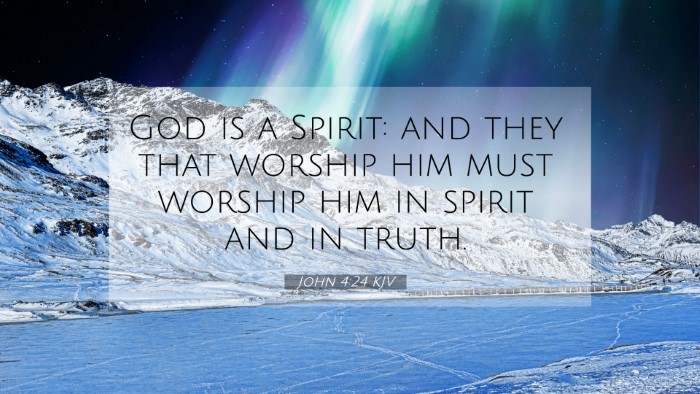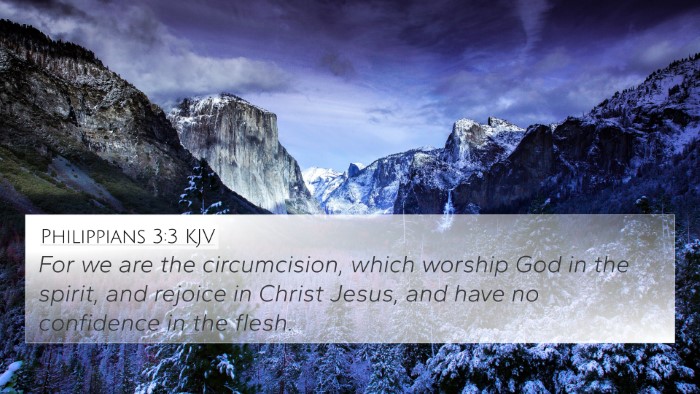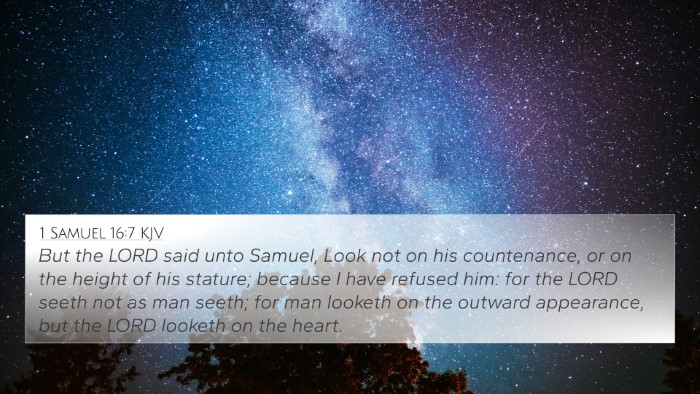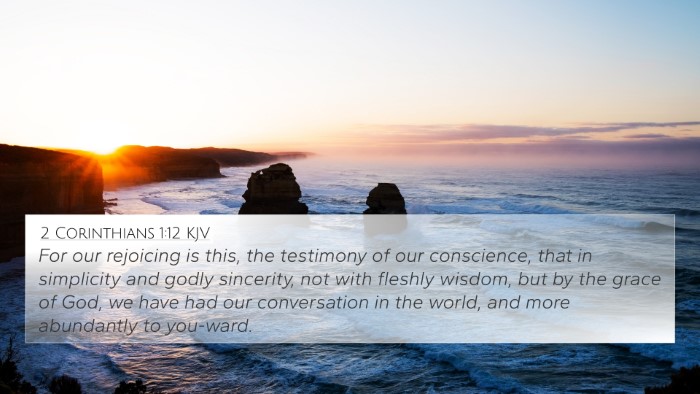Understanding John 4:24
Verse: John 4:24 - "God is spirit, and those who worship him must worship in spirit and truth."
Summarized Meaning of John 4:24
This verse encapsulates fundamental teachings about the nature of God and the essence of true worship. It emphasizes that God transcends physical form, existing as a spirit, and therefore, sincere worship is not confined to physical places or rituals but must resonate from the heart, embracing both spiritual authenticity and truthfulness.
Commentary Insights
Matthew Henry's Commentary
Matthew Henry explains that God's spiritual nature signifies that He is not confined to materiality or location, emphasizing that any form of worship that attempts to limit God to a physical aspect is misguided. True worshipers recognize this and approach God with sincerity and in alignment with His nature, seeking an inner communion rather than mere compliance with outward rituals.
Albert Barnes' Commentary
Albert Barnes notes that worshiping in "spirit and truth" reflects an understanding that authentic worship must involve the heart (spirit) and be based on the revealed truth of God. He points out that this directive serves as a rebuke to those who relied on ceremonial correctness as a means of pleasing God, urging believers towards a more profound inner spirituality.
Adam Clarke's Commentary
Adam Clarke expands on the notion of "spirit" by discussing the necessity of emotional and mental engagement in worship. He asserts that without truth, worship becomes hollow; hence, the interplay between spirit and truth is vital for a meaningful relationship with God. Clarke emphasizes that worship must align with God's character and revelation as seen in scripture.
Cross-References Related to John 4:24
- Exodus 20:4-5 - Addresses the prohibition against idolatry, affirming the necessity to worship God in spirit rather than through physical representations.
- Romans 12:1 - Calls believers to present their bodies as living sacrifices, highlighting that worship is an act of devotion and is holistic, involving body, mind, and spirit.
- Philippians 3:3 - Speaks of worshiping by the Spirit of God, aligning with the theme of spiritual worship rather than fleshly rituals.
- 2 Corinthians 3:6 - Discusses the difference between the letter of the law and the Spirit, illustrating that new covenant worship is about life in the Spirit.
- Hebrews 10:19-22 - Encourages believers to draw near to God with a sincere heart and full assurance of faith, aligning with the verse’s emphasis on authenticity in worship.
- Psalm 51:17 - States that God does not desire sacrifice but a broken spirit, emphasizing the inward aspects of true worship over outward rituals.
- 1 Peter 2:5 - Describes believers as living stones being built into a spiritual house, reinforcing the concept that collective worship among believers should be spiritually rooted.
Thematic Connections in the Bible
The message of John 4:24 is repeated throughout scripture, urging a shift from external rituals to internal, heartfelt devotion. The implications of worshiping God in spirit and truth resonate similarly in various biblical narratives and teachings:
- Spiritual Worship: The theme of spiritual worship is prevalent in both the Old and New Testaments, illustrating God's desire for genuine relationships with His people.
- Contrast Between Ritual and Truth: Throughout scripture, there are numerous examples where God rebuked empty rituals, calling His people back to authentic worship.
- The Role of the Holy Spirit: The New Testament teachings consistently emphasize the involvement of the Holy Spirit in guiding believers to true worship.
Conclusion
In summary, John 4:24 provides significant insights into the nature of God and the quality of worship that He desires. Through the collective teachings of respected commentaries and scriptural references, we see a clear directive towards a deeper, spiritual, and truthful experience in worship. Understanding and applying the principles found in this verse can enhance our worship practices, fostering a closer relationship with God based on His nature as Spirit.
Tools for Bible Cross-Referencing
To further study the connections and parallels within the scriptures, utilizing various tools for Bible cross-referencing can enhance one’s understanding:
- Bible Concordance: An index of words and phrases found in the Bible, helpful for locating themes and ideas.
- Bible Cross-Reference Guide: Resources that help identify verses with similar themes or concepts.
- Cross-Reference Bible Study: Methods that utilize inter-Biblical dialogue to enrich understanding and context of scriptural passages.
- Bible Chain References: A method that connects related verses, allowing deeper studies of specific themes.













